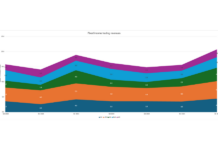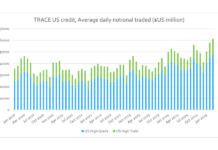Tariff tumult in the US Treasuries market saw average daily notional volume spike over March, up 31% year-on-year (YoY) to US$1.089 trillion at the end of the month.
The proportion of that volume e-traded, though, dropped back in the face of uncertainty, with dealer-to-dealer, on-the-run and voice trading rising in popularity over the month, according to Coalition Greenwich. By 4 April, notional volume had spiked while average trade sizes declined, indicating an increase in block trading. Regardless, though its share of the market decreased overall growth meant that March was still a record month for e-trading notional volumes.
MarketAxess saw a record trading week post-tariff implementation, exceeding its previous record by more than 40%.
A notional total of US$102.3 billion in US government bonds were traded on 9 April, an all-time record for the platform. The record was previously US$58.4 billion, traded on 13 March 2023.
Competitor Tradeweb also saw record US government bond volumes in March, with ADV hitting US$249.3 billion – up 30% YoY. April statistics will be released in early May.
The Depository Trust & Clearing Corporation’s (DTCC) Fixed Income Clearing Corporation (FICC) also reported record volumes on 9 April, clearing more than US$11 trillion in US Treasuries by the end of the day.
Central clearing for US Treasuries is to become compulsory on 21 December 2026 for cash trades and 30 June 2027 for repos.
READ MORE: Mandatory central clearing pushed back at SEC
Laura Klimpel, managing director and head of fixed income and financing solutions at DTCC, commented: “Even in times of market stress, FICC’s ability to effectively process historically high volumes reaffirms the strength of the central clearing model in safeguarding the integrity of the world’s deepest and most liquid market. It also demonstrates the essential value that FICC provides as a critical infrastructure, mitigating risk and reinforcing confidence across financial markets.”
©Markets Media Europe 2025

























